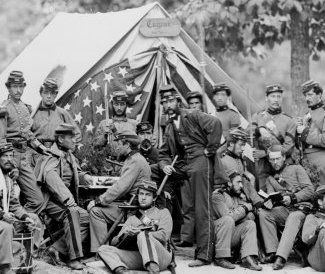Civil War Data Shows Father’s Trauma Can Affect Son’s Lifespan
An economist at the University of California Los Angeles (UCLA) has used Civil War data to determine that trauma experienced by a father can affect the lifespan of his son, but that a mother’s healthy diet during pregnancy can neutralize this risk.
Researcher Dora Costa used records from the National Archive to identify Union soldiers who were held as prisoners of war (POWs) by the Confederacy. She compared records of their children’s lifespans to the children of Union soldiers who were never held as POWs, finding that the sons of POWs were more likely to have died at any given age. (The study included only children who lived to be at least 45 years old.) Detailed records were kept because families of soldiers and POWs were eligible for generous pensions.
When looking at the data, Costa expected to find that socioeconomic status was the factor that explained discrepancies in lifespans among children of Civil War veterans. However, she noticed that the difference in lifespan only appeared in sons, and only to sons born after the war.
This pointed to an epigenetic explanation. Epigenetics is the idea that some aspects of a parent’s experiences (such as deprivation, drug use, etc.) can be passed on to their children during the gene transcription process. While a parent’s inherited genetic sequence doesn’t change, the structure of their DNA can be wound tightly or loosely depending on life experiences, and this affects how easily their genes are transcribed when passed on to their children.
The sons of POWs in the worst camp environments (typically during the later years of the war when prisoner exchanges were less frequent and overcrowding and malnutrition were common in camps) had even shorter lifespans than the sons of POWs who were imprisoned in less dire circumstances.
The research also looked at birth months to determine whether mothers would have had access to good nutrition while pregnant. Sons born to POW fathers in the later months of the year (whose mothers were likely to have had access to good nutrition) had lifespans comparable to the sons of non-POWs, while sons of POWs born earlier in the year fared worse.
The research was published in the journal Proceedings of National Academy of Sciences in 2018.
Editor’s Note: This is another example in humans of findings that have been clear-cut in animal studies. A father’s experiences, such as stressors or substance abuse, can influence the next generation even if the parent has no contact with the offspring. Epigenetic marks on DNA, histones (the structures around which DNA is wound), or microRNA of the sperm appear to carry these unexpected transgenerational effects.


